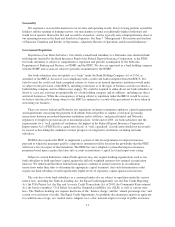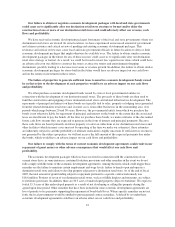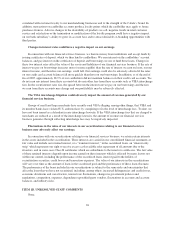Cabela's 2005 Annual Report Download - page 30
Download and view the complete annual report
Please find page 30 of the 2005 Cabela's annual report below. You can navigate through the pages in the report by either clicking on the pages listed below, or by using the keyword search tool below to find specific information within the annual report.• outside printers and catalog production vendors to print and mail our catalogs and to convert our
catalogs to digital format for website posting;
• shipping companies, such as United Parcel Service, the U.S. Postal Service and common carriers, for
timely delivery of our catalogs, shipment of merchandise to our customers and delivery of merchandise
from our vendors to us and from our distribution centers to our destination retail stores;
• telephone companies to provide telephone service to our in-house customer care centers;
• communications providers to provide our Internet users with access to our website and a website hosting
service provider to host and manage our website; and
• software providers to provide software and related services to run our operating systems for our direct
and retail businesses.
Any disruption in these services could have a negative impact on our ability to market and sell our products,
and serve our customers. Our ten largest vendors collectively represented 16.8% of our total purchases in fiscal
2005. If we are unable to acquire suitable merchandise or lose one or more key vendors, we may not be able to
offer products that are important to our merchandise assortment. We also are subject to risks, such as the
unavailability of raw materials, labor disputes, union organizing activity, strikes, inclement weather, natural
disasters, war and terrorism, and adverse general economic and political conditions, that might limit our vendors’
ability to provide us with quality merchandise on a timely basis. We have no contractual arrangements providing
for continued supply from our key vendors and our vendors may discontinue selling to us at any time. We may
not be able to develop relationships with new vendors, and products from alternative sources, if any, may be of a
lesser quality and more expensive than those we currently purchase. Any delay or failure in offering products to
our customers could have an adverse impact on our revenue and profitability. In addition, if the cost of fuel rises,
the cost to deliver merchandise to the customers of our direct business and from our distribution centers to our
destination retail stores may rise, which could have an adverse impact on our profitability.
Political and economic uncertainty and unrest in foreign countries where our vendors are located
could adversely affect our operating results.
In fiscal 2005, approximately 59.2% of our merchandise was obtained directly from vendors located in
foreign countries, with approximately 36.1% of our merchandise being obtained from vendors located in China,
Taiwan and Japan. In addition, we believe that a significant portion of our other vendors obtain their products
from foreign countries that may also be subject to political and economic uncertainty. We are subject to risks and
uncertainties associated with changing economic and political conditions in foreign countries where our vendors
are located, such as:
• increased import duties, tariffs, trade restrictions and quotas;
• work stoppages;
• economic uncertainties (including inflation);
• adverse foreign government regulations;
• wars, fears of war and terrorist attacks and organizing activities;
• adverse fluctuations of foreign currencies; and
• political unrest.
We cannot predict when, or the extent to which, the countries in which our products are manufactured will
experience any of the above events. Any event causing a disruption or delay of imports from foreign locations
would likely increase the cost or reduce the supply of merchandise available to us and would adversely affect our
operating results, particularly if imports of our Cabela’s branded merchandise were adversely affected as our
margins are higher on our Cabela’s branded merchandise.
18
























